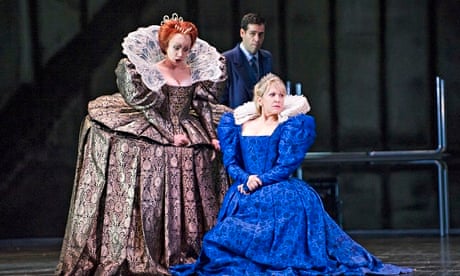The most famous scene in Donizetti's opera is a personal confrontation between Mary Stuart and her cousin Elizabeth I – an event that never actually occurred, but which forms the crux of the piece and the moment at which Mary's fate is effectively decided. In this new production by the directorial duo of Moshe Leiser and Patrice Caurier, it takes place in a modern prison where everyone is dressed in contemporary clothes other than Mary and Elizabeth, who are in period frocks. This trope – whereby only the two queens are in 16th-century garb while all around is the here-and-now – runs throughout the visual side of the show, in which Leiser and Caurier are joined by their regular team of collaborating designers.
The same crew has already given the Royal Opera a substantial and broadly successful run of traditional productions, mostly characterised by visual elegance and bags of stagecraft, though their touch feels far less certain this time around; with more than half the opera relocated to the inside of the jail, a feeling of drabness sets in.
What gives the evening genuine distinction, nevertheless, are the individual vocal performances, and especially those from the protagonist and her implacable opponent. In purely vocal terms, Carmen Giannattasio's spitfire Elizabeth arguably offers more sheer voice, but Joyce DiDonato musters greater bel canto refinements while both her physical and her vocal acting are extraordinarily proficient; the final result would be a pretty even battle royal had Donizetti not given Mary the bigger opportunities.
Surrounding them at Elizabeth's court are Ismael Jordi's dynamic but tight-toned Leicester, Matthew Rose's resonant, crypto-Catholic Talbot, and Jeremy Carpenter's dour, hard-man Cecil – rarely seen without an axe in hand and forever encouraging Elizabeth to use it. Bertrand de Billy conducts efficiently, though it is the singers who supply the passion.

Comments (…)
Sign in or create your Guardian account to join the discussion